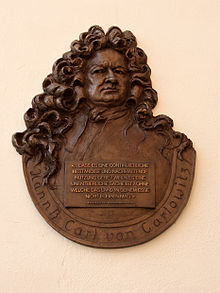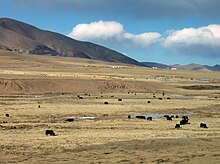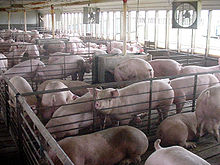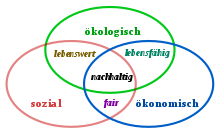sustainability


Sustainability is a principle of action for the use of resources , in which a lasting satisfaction of needs is to be guaranteed by preserving the natural regenerative capacity of the systems involved (especially of living beings and ecosystems ).
Concept history
The term has a complex and multifaceted conceptual history. The word sustainability comes from the verb to follow , which means “to last or stay for a long time”. Nowadays there are three main meanings to be distinguished:
- the original meaning of a "long-lasting effect" ( Duden ),
- the special forest scientific significance as a "forestry principle, according to which no more wood may be felled than can grow back" (Duden),
- the modern, comprehensive meaning in the sense of a "principle [s] according to which no more may be consumed than can grow back, regenerate and be made available again in the future" (Duden).
A first-time use of the term sustainability in German in the sense of a long-term responsible handling of a resource is proven by Hans Carl von Carlowitz in his work Silvicultura oeconomica in 1713 . Carlowitz asked "how to do a sothane [such] conservation and cultivation of the wood / that there is a continuous, permanent and sustainable use / because it is an indispensable thing / without which the land cannot remain in its forge".
The noun sustainability was the latest in 1832 by the German forester Emil André his title in the Prague published book Simplest the highest yield and the sustainability of all making sure end Forst Wirth shaft method used.
In a dictionary entry from 1910, sustainability is regarded as a translation of the Latin perpetuitas and is the constant and incessant as well as the uninterrupted, the effective and emphatic or simply the success or the effectiveness of a thing. Before 1860, the designation as a noun was not yet lexically recorded, in 1915 for the first time in spelling (the adjective sustainable is different ); Until the 1980s it had the meaning of permanence in everyday language and was not used for a term with a political meaning. For example, the word sustainable appears in Meyers Konversations-Lexikon from 1905 in the sentence "In order to provide sustainable warming of the rooms, the boiler of the hot water heating must have a relatively large capacity", and furthermore in the statement that a forest is already sustainable Represents a form of forest management.
Younger use
In current linguistic usage , different conceptions compete:
- an understanding in everyday language that states that something can or should last for a long time after it has been built, started and / or set in motion;
- different political views that vary this basic understanding of permanence according to the position of different interest groups. This expansion resulted initially from the global environmental policy debate since the Second World War, in particular with the definitions provided by the World Commission for Environment and Development (Brundtland Commission) set up by the United Nations in 1983, the Club of Rome or the German Enquete Commission Bundestag. They mostly expanded the term well beyond the original meaning of the system function. After ecological ideas have gained general acceptance, the term “sustainability” is used for a large number of concepts and products where economic interests have been identified, which is why the expression now has a somewhat “dubious reputation” in the eyes of some.
- From 2009 the term grandchildren will appear as a synonym for sustainability . Since 2010, and increasingly since 2014, it has also been used in politics outside the green spectrum and also in the federal government's sustainability strategy . The German sustainability strategy in the new edition from 2016 is headed with the slogan "The way to a future that is fair to grandchildren". The synonym serves as a symbol for a markedly sustainable world, in which our economic activity does not reduce the chances of future generations (see also intergenerational equity ).
criticism
Some authors state that sustainability has become a “rubber word” due to the diverse definition . At the same time, however, it is emphasized that the idea "can only be communicated as a rubber word [...] in all areas of society". In order to avoid the blurring problems with the term sustainability , in disputes about environmentally friendly forms of civilization, other terms such as civilization ecology or future compatibility are sometimes used , which, however, have not yet prevailed.
Traditional sustainability

Subsistence-oriented , traditional forms of economy that are still largely unchanged (such as hunting and gathering , farming (provided that the natural areas are still sufficiently large and sparsely populated) as well as remote grazing ) form stable and lasting - i.e. sustainable in the original sense - economic systems that operate in a variety of ways are networked with natural ecosystems. They are characterized by efficient , slow and continuous adaptation of land use to the respective site conditions for centuries.
However, this effect is more and more reversed when rapid economic and social change creates problems whose effects cannot be foreseen (see also cold and hot cultures or options ).
The Convention on Biological Diversity of the United Nations recognizes that traditional ways of life are sustainable in a particular degree, not reduce biodiversity. In contrast to industrialized societies, which are not directly dependent on a specific area, such communities have a direct interest in maintaining and protecting these ecosystems, the stability of which they have never endangered.
Ethnology has shown that traditionally sustainable economic activity in many indigenous cultures (before contact with Europeans) was anchored in the cultural memory of animistic worldviews , myths , rituals and taboos of the ethnic religions as a moral guideline of a "holy connection to the earth" (→ see also: wild thinking ) . According to Odum and Cannon , all stable systems have mechanisms that keep their state of equilibrium as constant as possible and compensate for fluctuations in the environment. The anthropologists Roy Rappaport , Gerardo Reichel-Dolmatoff and Thomas Harding have independently established that the myths and ritual cycles of the so-called " primitive peoples " fulfill precisely this task and enable the communities to adapt to changes in the environment as much as possible and the stability of the Impairing ecosystems as little as possible .
Current concepts of sustainability
The World Commission for Environment and Development (Brundtland Commission) set up by the United Nations in 1983 had a decisive influence on the international debate on development and environmental policy , without, however, referring to the origin of the German forestry debate. The commission, chaired by the former Norwegian Prime Minister Gro Harlem Brundtland , was given the task of identifying long-term prospects for a development policy that is also environmentally friendly . In its final document, Our Common Future, from 1987, also known as the Brundtland Report , the concept of sustainable development inspired by this guiding principle is defined.
Variety of definitions
Sustainability is a term used in science as well as in politics and business practice. It serves less as a descriptive but rather as a normative target term. The terms "sustainability" and "sustainable development" are often used synonymously . At least the following three variants compete in the debate:
- With the work of the Brundtland Commission of the UN and the subsequent UN Conference on Environment and Development in 1992 , a concept of sustainability that was supposed to unite different political interests became socially acceptable; environmental policy goals should be placed on an equal footing with economic and social development goals. The term sustainability is used here as a set of goals: Permanently stable societies can be achieved by not playing off ecological, economic and social goals against each other, but striving for them on an equal footing. This understanding of sustainability includes the requirement that these goals apply to all countries in the world (global justice) and for future generations (intergenerational justice). This approach was further elaborated by the Enquete Commission of the German Bundestag and presented as a three-pillar model of sustainability ; according to this, the concept of sustainability itself is composed of three components to form ecological, economic and social sustainability. Critics of this understanding of the term see the equal weighting of these pillars basically only describing the current state of all things and not a demand for more sustainable development.
- A prominent interpretation of the term that began soon after the UN conference sees it as a leitmotif of ecological modernization. This interpretation also characterizes various funding programs, which means that this environmentally-oriented understanding of the term is also implemented with the help of high funding. From this point of view, the UN conference in Rio was even criticized as a failure by many environmental associations. Well-known critical books were Die Ökofalle by Christoph Spehr and Sustainable, modern, loyal to the state by Jörg Bergstedt .
- In the economic and economic policy debate, sustainability is occasionally also used in the combination of "sustainable economic growth" in the sense of lasting economic success. Here the term sustainability is used e.g. B. applied to fiscal policy .
Sustainability Debate in Germany
The German political debate on this term is closely linked at the local level to the Local Agenda 21 processes initiated by the UN conference . At the federal level the designation since that is Study Commission on "Protecting humans and the environment, objectives and framework of Sustainable Development" from 1995 used stronger. The first interim report of the commission already served at the first Rio follow-up conference in New York in 1997 (“ Rio Plus 5 ”) to report on the German contributions to the implementation of the sustainability concept.
In the German political debate, Bündnis 90 / Die Grünen still dominated the concept of sustainability in the 1998 Bundestag election , but it was also mentioned by all other parties represented in the Bundestag. For the 2002 Bundestag election , with the exception of the Greens, the other parties used the word sustainability much more frequently than four years earlier.
Three guiding strategies
Three strategies are often used in the discussion about sustainable development:
- Sufficiency : reduction in production and consumption
- Efficiency : more productive use of material and energy
- Consistency : nature-friendly material cycles, recycling, waste avoidance
Sustainability in the modern economy
Lifespan of products
- Companies use the durability of their products as a sales argument for their customer loyalty . However, the proportion of products that advertise with a “lifetime guarantee” as an advantage only makes up a small percentage. Such products have an increased shelf life through the use of higher quality materials and manufacturing processes.
- Industries that maintain short product cycles and, such as the automotive industry, very often use design model updates to visually age their products, therefore refer less to their products than to production or disposal when it comes to sustainability.
- In terms of sustainability, an economy that develops products with planned obsolescence is questionable. These products are manufactured in modified versions and advertised with new product features. For this purpose, companies rarely store spare parts beyond the guarantee period. The cost of a repair is usually higher than the market value of the product. As a counter-trend, a market has emerged for high-priced goods that uses engineering methods to identify defects in wear parts and offers improved spare parts compared to original parts. Another counter-trend is the purchase of old products that have proven their reliability over a long period of time and, due to their low complexity, can be easily repaired if a repair is necessary.
Sustainability as a sales argument
- For many companies, the attribute “sustainable” has become a component of their PR strategy that is difficult to verify. On the other hand, there are concepts of sustainability management, which combine business success with the consideration of social and ecological aspects. Accordingly, companies can gain a competitive advantage through particularly sustainable action.
- Certification of products should make sustainability in various areas (e.g. eco, fair, biodynamic) verifiable for the consumer. Sustainability certification and balance sheets for the entire company, including its products, cover a broader range of sustainability and signal the sustainable management of the economic player.
Sustainability in cultural history
- Different cultures have applied the idea of durability to their architecture - partly for its function as a monument over time and for purely practicality. Buildings and structures were designed and built that could fulfill their function and be operated without maintenance, so that future generations could benefit from them.
- The principle of sustainability in forest management can be found long before the founder of the term, Hans Carl von Carlowitz, in an old ecclesiastical document: in the constitutions of the Camaldolese Benedictine hermits from Camaldoli from 1350 - practically the first forest system in Italy. The Benedictines cultivated their fir forests around the Camaldoli Monastery, founded in 1012 in northern Tuscany, without clearing, with individual tree trunks and replanting. The monastery, with its criteria for sustainable forestry drawn up by an abbot, is therefore considered to be the nucleus and "root of sustainability".
- In its basic idea, sustainability contains benefits for everyone involved . If, however, the switch to sustainable forms of economy takes place out of necessity, because the depletion of resources is already very far advanced, then there is definitely potential for conflict. In the German timber industry of the 18th and 19th centuries - when there were hardly any forests left - people asked themselves who would benefit from this new forest management and who would not. This can be better understood if one realizes that in the winters (the “ Little Ice Age ” at that time ) people relied on every fathom of firewood in order not to freeze to death. The need was there immediately and far too great to be met - there was an acute shortage of wood . Sustainability in forestry requires, however, that enough trees remain standing, some of which had to be protected from theft by desperate people with police force. Similar “inevitable” conflicts of interest are still the order of the day in many areas of the world where sustainability is supposed to replace advanced overexploitation.
UN Sustainable Development Goals
At the end of September 2015, the United Nations General Assembly adopted the “2030 Agenda for Sustainable Development” at the 2015 World Summit for Sustainable Development . This includes 17 " goals for sustainable development " ( English Sustainable Development Goals , SDGs ; French Objectifs de développement durable ): They are political objectives United Nations (UN) to ensure sustainable development in economic , social and ecological level in the world and were in Designed based on the development process of the Millennium Development Goals (MDGs). On January 1, 2016, they came into force for a period of 15 years (until 2030). In contrast to the MDGs, which were particularly applicable to developing countries , the SDGs apply to all countries.
science
The subject of sustainability science has been established at universities since 2001 . Research outside of the university environment is mostly summarized under the heading of social-ecological research . The Federal Ministry of Education and Research is funding research projects on climate change, the seas and oceans, the cities of the future and the sustainable use of resources in the framework program “Research for Sustainable Development (FONA)”. With the FONA framework program, the federal government is implementing the national sustainability strategy .
At the beginning of March 2015, the Freiburg Sustainability Center , a cooperation between the Albert Ludwigs University there , the five Freiburg institutes of the Fraunhofer Society and companies from industry, started.
Awards
Since 2008, the Foundation has awarded German Sustainability Award annually to the German Sustainability Award publicity at a major gala.
See also
- Bioeconomy
- Alliance for Sustainable Textiles , Textile Seal
- Sustainable banking
- Comprehensive wealth
- Digital sustainability , social sustainability
- Institute for Advanced Sustainability Studies
- Sustainable land management , strong sustainability
- Permaculture
- Planetary Boundaries (planetary load limits)
- Sustainable Churches , Sustainable Development Solutions Network , Sustainable Supply Chain Management , Sustainable Process Index
- Sustainability Congress in Assisi
literature
Factual reports
- Philipp Wolff (Eds.), Martin Ammon, Heike Uhlemann: CleanTech Special - Sustainability , German CleanTech Institute Bonn, November 2009. Free report, 68 pages.
- Hartmut Bossel (IISD): Indicators for Sustainable Development (Theory, Method, Applications) (PDF; 727 kB), 1999, ISBN 1-895536-13-8
- German Bundestag (Ed.): Concept Sustainability - Foundations for the Society of Tomorrow . Bonn 1997, ISBN 3-930341-32-8 .
- Herbert Kaden : On the "invention" of the term - a source analysis . In: Sächsische Heimatblätter vol. 58 (2012), issue 4, pp. 384–391 (fundamental analysis of the fashionable term "sustainability")
Newspaper articles
- Ulrich Grober , The Inventor of Sustainability , Die Zeit, November 25, 1999 (No. 48), p. 98 online .
- Ulrich Grober, sustainability - but what is it? A journey through time to the sources of our guiding concept, insights and perspectives (3/12), pp. 148–163
- Ulrich Grober, The Discovery of Sustainability - Hans Carl von Carlowitz , natur, 03/2013, pp. 62–63
Non-fiction
- Hans Carl von Carlowitz (Hannß Carl von Carlowitz): Sylvicultura oeconomica. Instructions for wild tree cultivation , Braun, Leipzig 1713, with the quote “sustainable use” on page 105 ( digital copy from SLUB Dresden ); Reprint of the first edition: Kessel, Remagen 2012, ISBN 978-3-941300-56-9 ; Reprint of the 2nd edition, Braun, Leipzig 1732, Kessel, Remagen 2012, ISBN 978-3-941300-19-4 .
- Emil André: The simplest forestry method that ensures the highest yield and sustainability . By means of a generally comprehensible forest management regulation based on appraisal, field division and management plan. Borrosch and André, Prague 1832 ( limited preview in Google Book Search [accessed August 29, 2019]).
- Hans Carl von Carlowitz (Hannß Carl von Carlowitz): Sylvicultura oeconomica. Instructions for wild tree breeding , transcription into contemporary German (Bendix / Thomasius), Kessel, Remagen 2013, ISBN 978-3-941300-70-5 ( reading sample ).
- Ulrich Grober : The discovery of sustainability - cultural history of a term , Kunstmann, Munich 2010, ISBN 978-3-88897-648-3 .
- Felix Ekardt : The principle of sustainability. Intergenerational justice and global justice . 2nd edition, Beck'sche Reihe 1628, Munich 2010, ISBN 978-3-406-61126-1 .
- Nina Katz, Dagmar Vinz: Sustainable Development , in: ABC of Globalization. From “old-age insurance” to “civil society” (published by the scientific advisory board of attac , taz , Heinrich Böll Foundation , editor: Claudia von Braunmühl), VSA, Hamburg 2005, pp. 126–127, ISBN 978-3-89965-139 -3 .
- Iris Pufé: sustainability . 3rd, revised and expanded edition. UVK / Lucius / UTB, Munich 2017, ISBN 978-3-8252-8705-4 .
Scientific literature and specialist articles
- Felix Ekardt: Theory of Sustainability. Ethical, legal, political and transformative approaches - using the example of climate change, scarcity of resources and world trade . 3rd edition or 2nd edition of the new edition Nomos, Baden-Baden 2016, ISBN 978-3-8329-6032-2
- Bernd Klauer: What is sustainability and how can you achieve sustainable development? , in: Journal for Applied Environmental Research , Vol. 12 (1999), Issue 1.
- Armin Grunewald, Jürgen Kopfmüller (2006): Sustainability . Campus, Frankfurt am Main / New York, NY 2006. ISBN 978-3-593-37978-4 (= campus introductions ).
- Hans G. Nutzinger (Ed.): Sustainable economy and energy supply. Concepts, conditions, starting points . Metropolis, Marburg 1995, ISBN 3-89518-023-8 .
- Wolfgang Wüst: Sustainable State Policy? Princely rule and the environment in the premodern , in: Journal for Bavarian State History 70 (2007) Issue 1, pp. 85-108. ISSN 0044-2364 .
- Diethelm Klippel / Martin Otto: Sustainability and conceptual history , in: Wolfgang Kahl (Hrsg.): Sustainability as a collective concept . Mohr Siebeck, Tübingen 2008, pp. 39-59, ISBN 978-3-16-149573-1
- Gerhard de Haan et al .: Sustainability and Justice. Basics and practical consequences at school . Springer, Berlin / Heidelberg 2008, ISBN 978-3-540-85491-3 .
- Hans Diefenbacher : Justice and Sustainability. On the relationship between ethics and economics , WBG Wissenschaftliche Buchgesellschaft, Darmstadt 2012, ISBN 978-3-534-25050-9 .
- Michael Rödel: The Invasion of Sustainability. A linguistic analysis of a political and economic buzzword , in: Deutsche Sprache , Jg. 41 (2013), pp. 115–141.
- Ingolfur Blühdorn / Felix Butzlaff / Michael Deflorian / Daniel Hausknost / Mirijam Mock: Sustainable non-sustainability. Why the ecological transformation of society does not take place . transcript, Bielefeld 2019, ISBN 978-3-8376-4516-3 .
Web links
International
- rfsc.eu: The Reference Framework for Sustainable Cities ("The Reference System for Sustainable Cities ")
- sustainablecities.net
- Umweltbundesamt (Austria) , Umweltbundesamt.at : Making sustainability tangible - increase in entropy as a measure of sustainability (symposium on April 27, 2012 in Vienna)
National
- Education for Sustainable Development. German UNESCO Commission eV, Bonn, accessed on August 4, 2010 .
- Research for sustainability (FONA research program). Federal Ministry of Education and Research (BMBF), Berlin, accessed on August 4, 2010 .
- forschdb.verwaltung.uni-freiburg.de: Interreg - Upper Rhine Cluster for Sustainability Research
- Innovation Academy - travel into the future today
- The "Sustainability Project". On the limits of the sustainability concept from a cultural perspective. (PDF; 759 kB) Cultura21 eBooks series on culture and sustainability, accessed on December 10, 2010 . , Master's thesis by Lisa Grabe, University of Lüneburg
- Lexicon of sustainability. Aachen Foundation Kathy Beys , accessed on August 4, 2010 .
- National sustainability strategy in Germany. Federal Government, accessed on September 13, 2010 .
- Sustainable Development Council. German Society for Technical Cooperation (GTZ) (Federal Government), accessed on August 4, 2010 .
- n-netzwerk.de: Sustainability Network
- renn-netzwerk.de ("RENN networks actors from all areas of society so that sustainable development becomes a living practice in our regions")
- Knowledge portal: future-life-sustainability. An educational project of the University of Wismar in cooperation with the Silberfuchs-Verlag, accessed on November 4, 2015 .
Individual evidence
- ↑ a b c Michael Rödel: The Invasion of Sustainability. A linguistic analysis of a political and economic buzzword. In: German language. Volume 41, 2013, pp. 115-141.
- ↑ a b c Lexicon entry: Sustainability . In: Duden - German Universal Dictionary. 4th edition, Mannheim 2001, pp. ??.
- ^ Jacob Grimm , Wilhelm Grimm : sustainable . In: German dictionary . Volume 13, Hirzel, Leipzig 1869, column 69.
- ↑ Ulrich Grober: Urtexte - Carlowitz and the sources of our concept of sustainability. In: Nature and Landscape . Year 2013, issue 2, p. 46.
- ^ Hans Carl von Carlowitz : Sylvicultura oeconomica. Braun, Leipzig 1713, p. 105.
- ^ Meyer's Large Conversational Lexicon . 6th edition. Bibliographisches Institut, Leipzig / Vienna 1909 ( zeno.org [accessed on August 29, 2019] Lexicon entry "André, 3) Emil").
- ^ Dictionary entry German-Latin on "sustainable". Karl Ernst Georges: sustainable. In: Small German-Latin concise dictionary. Emphasis. Darmstadt 1999, column 1740 (first Hanover / Leipzig 1910).
- ↑ Könizer Zeitung: [ https://www.danieleganser.ch/assets/files/Inhalte/Rezimen/Vortraege/Vortrag%20Okt%2009%20gantrisch_forum.pdf We will soon be on the summit! ] November 2009.
- ↑ Hello Hollstein , News and Topics from the Baltic Sea Coast, Sustainable Agriculture: State Secretary Rabius sees Schleswig-Holstein on the right track ... ( Memento from February 15, 2016 in the Internet Archive ) October 29, 2010.
- ↑ Working group self-employed in the SPD in NRW, AGS New Year's reception in Bottrop , February 19, 2014.
- ↑ The Federal Government, Taking Responsibility , November 2014.
- ↑ German Sustainability Strategy - New Edition 2016 ( Memento from January 12, 2017 in the Internet Archive ), Ed .: Die Bundesregierung, as of October 1, 2016, Cabinet resolution of January 11, 2017, p. 11.
- ↑ a b Karin Wullenweber: catching words. What the language reveals about sustainability. In: Politische Ökologie 63/64, January 2000, p. 23 f.
- ^ Rüdiger Wittig, Manfred Niekisch: Biodiversity. Basics, hazard, protection. Berlin, Heidelberg 2014, p. 530.
- ↑ a b c Edward Goldsmith : The Way. An ecological manifesto. 1st edition. Bettendorf, Munich 1996 p. 332 ff.
- ↑ TC McLuhan: ... Like the breath of a buffalo in winter. Hoffman and Campe, Hamburg 1984.
- ^ Karl Polanyi : Economy and Society . German by Heinrich Jelinek. Suhrkamp Taschenbuch Wissenschaft stw 295, Frankfurt 1979.
- ^ A b Claude Lévi-Strauss : The wild thinking. Suhrkamp, Berlin 1973.
- ↑ Hendrik Neubauer (Ed.): The Survivors. From native to global citizen. Tandem-Verlag, 2008, p. 99
- ↑ Dieter Gawora, Maria Helena de Souza Ide, Romulo Soares Barbosa (ed.): Traditional peoples and communities in Brazil. Latin America Documentation Center. Kassel University Press, Kassel 2011, p. 9 u. a.
- ↑ Franz Rothe: Cultural-historical and cultural-ecological basics of the intensification and irrigation techniques of traditional agricultural cultures in East Africa: their development background and their ability to survive. Philosophical Faculty of the Albert Ludwig University of Freiburg i. Br., 2004, pp. 38-41.
- ↑ a b Anja von Hahn: Traditional knowledge of indigenous and local communities between intellectual property rights and the public domain. Springer, Berlin 2004, pp. 47–56
- ^ "Work" in archaic hunting societies. . Website: Dieter Steiner - Human Ecology. Retrieved June 12, 2013.
- ↑ Johannes Moser: Introduction to economic anthropology. Institute for Folklore / European Ethnology at the Ludwig-Maximilians-Universität, Munich 2008. Slide 39–57.
- ↑ Andrew P Vayda et al. Christine Padoch: Patterns of Resource Use and Human Settlement in Tropical Forests. In Tropical Rain Forest Ecosystems. Part A: Structure and Function. FB Golley (Ed.), Amsterdam, Elsevier, pp. 301-313.
- ↑ Urs Fankhauser: Mystery. Local, self-determined and sustainable. Worldwide importance of family farming. éducation21, Bern 2014, p. 8.
- ^ Roy Rappaport : Ecology, Meaning and Religion . Richmond: North Atlantic Books 1979.
- ↑ Edward Goldsmith : The Way. An ecological manifesto. 1st edition. Bettendorf, Munich 1996, p. 159 ff.
- ↑ A. Rosati, A. Tewolde, C. Mosconi, World Association for Animal Production (ed.): Animal Production and Animal Science Worldwide. Wageningen Academic Pub, 2005.
- ↑ Brundtland Report: Our Common Future, 1987 in the Lexicon of Sustainability
- ↑ a b c Jörg Tremmel: Sustainability as a political and analytical category. The German discourse on sustainable development as reflected in the interests of the actors. , Munich: Ökom-Verlag, 2003. ISBN 3-936581-14-2
- ↑ Scientific Advisory Board at the Federal Ministry of Finance: Expertise Sustainability in Financial Policy - Concepts for a Long-Term Orientation of Public Budgets (Issue 71), Berlin November 2001.
- ↑ Sustainable Financial Policy Badische Zeitung, March 6, 2013.
- ↑ Article on sustainability strategies at BUND Baden-Württemberg , accessed on May 15, 2020
- ↑ Siegfried Behrendt, Edgar Göll, Friederike Korte: Efficiency, Consistency, Sufficiency - Strategic Analysis Consideration for a Green Economy (IZT; 2016), accessed on May 15, 2020
- ↑ Benedikt Minge: Sufficiency, Consistency and Efficiency - Three Ways to More Sustainability (article at relaio.de from November 12, 2018), accessed on May 15, 2020
- ↑ Manfred Linz: Sufficiency as Political Practice - A Catalog (Wuppertal Institute for Climate, Environment, Energy; 2015), accessed on May 15, 2020
- ^ Eveline Lubbers (Ed.): Battling Big Business. Countering Greenwash, Infiltration and other Forms of Corporate Bullying . Green Books 2002, ISBN 978-1-903998-14-4 .
- ↑ Schaltegger, S. (2011): Sustainability as a Driver for Corporate Economic Success. Consequences for the Development of Sustainability Management Control, Society and Economy. Vol. 33, No 1, 15-28.
- ^ Original text reprinted in: Ferruccius, Aloisius Chrysostomus (1864); Cenni storici del sacro Eremo di Camalduli; Firenze.
- ↑ Archived copy ( Memento of October 4, 2013 in the Internet Archive )
- ↑ Hölzl, R. (2010): Historicizing sustainability: German scientific forestry in the eighteenth and nineteenth centuries. In Science as Culture , 19 (4): 431-460.
- ^ Hansjörg Küster : History of the forest. From prehistoric times to the present . CH Beck, Munich 1998, ISBN 3-406-44058-4 .
- ↑ Federal Ministry for Economic Cooperation and Development: Agenda 2030 for Sustainable Development. Retrieved January 9, 2020 .
- ↑ Rio + 20 result document "The future we want" (A / RES / 66/288), un.org, accessed on July 16, 2020.
- ^ TST Issues Brief: Conceptual Issues
- ↑ Research for Sustainable Development Research Framework Program of the Federal Ministry of Education and Research
- ↑ Badische-zeitung.de , March 7, 2015, Wulf Rüskamp: The view of the whole system
- ↑ Leistungszentrum-nachhaltigkeit.de
- ↑ German Sustainability Award on Sustainability Day.de
- ↑ Grand Gala ( Memento from February 15, 2016 in the Internet Archive ) on Sustainability Day.de.





